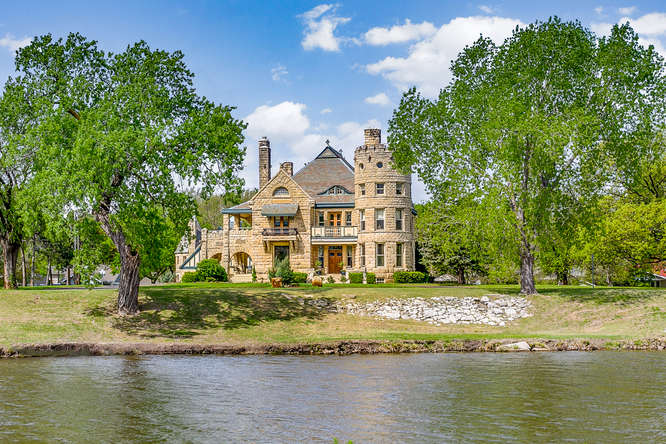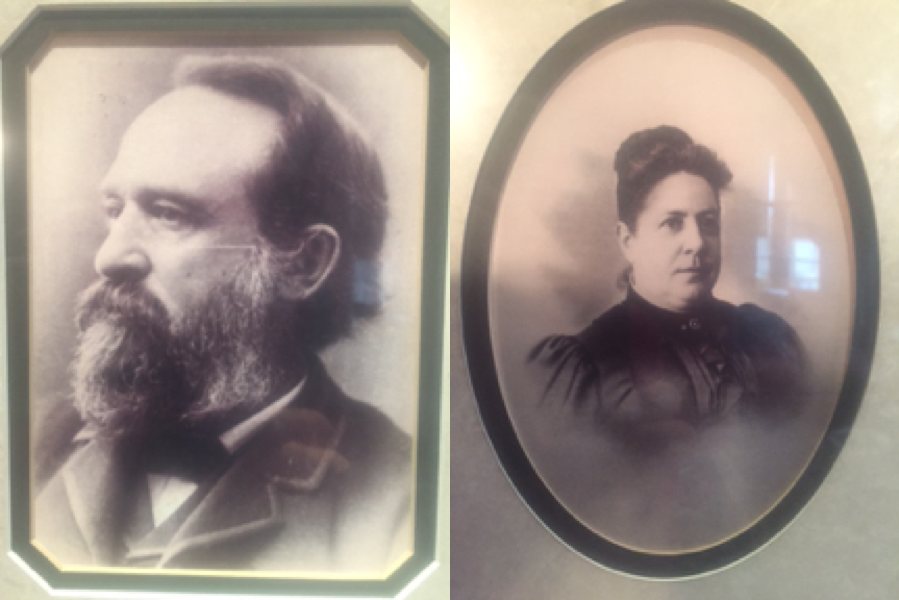Few buildings in Wichita provoke more curiosity than Campbell Castle, the 17-bedroom, feudal-style mansion overlooking the Little Arkansas River at 11th Street and North River Boulevard. As it turns out, builder Burton Harvey Campbell – also known as Col. “Barbecue” Campbell – was as fascinating as his home, a respected businessman and civic leader who may have owed some of his success to financial chicanery as well as cattle.
Campbell was born in western New York State in 1829 and moved to New York City by 1850, starting a family there with his first wife. By the end of the Civil War he was helping the government with the business end of Reconstruction, buying properties and settling claims for war losses. It was during this period that he earned the honorary title of “colonel.”
In 1867, four years after his first wife’s death, Campbell married again. He moved to northern Illinois in 1870 and started breeding Durham cattle, Norman horses and Cotswold sheep. Campbell held a dispersal sale in 1879 and moved to Hutchinson, but only stayed a year before relocating to Wichita.
Settling his family at the corner of Elm and Topeka, Campbell established ranching operations south of Caldwell in the Cherokee Strip, a disputed stretch of land along the Kansas-Oklahoma border. One of Campbell’s cattle brands was a “BQ” with a bar over it, which became the source of his nickname. Evicted by the federal government, Campbell managed to keep ranching there by leasing land from the Cherokee Indians.
In 1885, Campbell was hired as the first general manager of the mammoth XIT Ranch in Texas, which had been organized by a syndicate of businessmen who built the Texas State Capitol in Austin in exchange for 3 million acres of land in the Panhandle.
According to The XIT Ranch and the Early Days of the Llano Estacado, a 1929 book by J. Evetts Haley, a Texas historian and sometime politician, Campbell’s management of the ranch was riddled with fraud and mismanagement. Campbell contracted to buy cattle from a cousin, M.C. Campbell, who supplied the XIT with inferior and in some cases diseased cattle. “Barbecue” Campbell, meantime, allowed his cowboys to rustle some of the XIT’s cattle and brand it as their own, the book charged, and the ranch became a hangout for outlaws and hard cases of all kinds. Campbell was described as a “big- faced, overbearing, loud- mouthed, personally penurious and institutionally extravagant.”
He was fired by the XIT over the rustling allegations, but not before profiting from the nefarious practices he either directed or condoned. It should be noted that Haley’s book led to a libel suit over material in it not directly related to Campbell. Although the lawsuit was not success, Haley agreed to withdraw the book from the market.
In 1891, some four years after his firing by the XIT, Campbell and his cousin, M.C., started another operation by driving 800 cattle to a site along Day Creek in Clark County, Kan. Campbell also began accumulating land for another ranch along John’s Creek in Clark and Meade counties.
“Of the 35,000 acres enclosed we own about 14,000 acres which embraces all the water,” Campbell said at the time. A few months after the ranch’s establishment, Campbell’s twin sons, Charles and Robert, graduated from high school in Wichita and moved there to help in the operations.
Campbell paid $25,000 for a one-half interest in what became the Wichita Street Railway Company. He owned stock in the Wichita Union Stock Yards, and travelled to Chicago regularly for the city’s meat-packing houses. He chaired the men’s board of Wichita Hospital, which became St. Francis Hospital.
His wife, Ellen co-founded the Thursday Afternoon Cooking Club, which is still in existence today.
The planning and building of the Castle, begun in 1886 and completed two years later, was followed with interest by local newspapers of the time. Limestone blocks and a five-story turret make its exterior look like something out of the middle ages; inside, Campbell imported fireplaces, stained glass and even a staircase from Europe.
Charles was thrown from a horse on the ranch in Clark County and died on Nov. 1, 1902, the same day invitations to his wedding were issued. It was to have been a grand double ceremony with his twin brother. Instead, Robert’s wedding took place quietly in Wichita.
Ellen Campbell died in May 1907. The next fall, Campbell and his daughter, Eleanor, travelled to Mexico in an effort to restore his health. He died on the return trip on Jan. 2, 1901. Although best-known as a businessman, Campbell seems to have nurtured wide interests. In a biographical sketch from Notes on Early Clark County Kansas, Volume IV, Melville Campbell Harper, the daughter of M.C. Campbell, recalled Col. Campbell’s advice regarding a daughter’s education: “For fiction I would suggest Dickens, Thackery and Scott; for human nature in poetry, Burns and Shakespeare; for science Darwin; for philosophy Bacon and Huxley, and for humor, Mark Twain.”
And she left a vivid portrait of Campbell in his Castle.
“My memory of Colonel B.H Campbell is a picture I shall never forget. It is of a gray haired, thin, distinguished-looking gentleman, sitting in a large handsome reading chair by the side of a very long, at least twelve feet long, library table, a handsome table in a room some twenty by thirty five feet, with ceiling about twelve or thirteen feet high, the walls lined with books on three sides from floor to ceiling, completely engrossed in his book that he was reading, never realizing that there was a soul near him. I used to be told that at times he worked on a manuscript, as he was writing a history. And I was not alone in feeling a profound respect for the intellect of Colonel Burton Harvey Campbell.”
This article was adapted from a presentation by Jack Kellogg to the Wichita Bibliophiles. Kellogg’s great-grandfather, Caleb Wells Carson, a Clark County abstractor and real estate broker, owned land within the Campbell Ranch prior to its sale in 1909. The Campbell Castle, after being used as a bed-and-breakfast for several years, is being offered for sale for $3.5 million.










